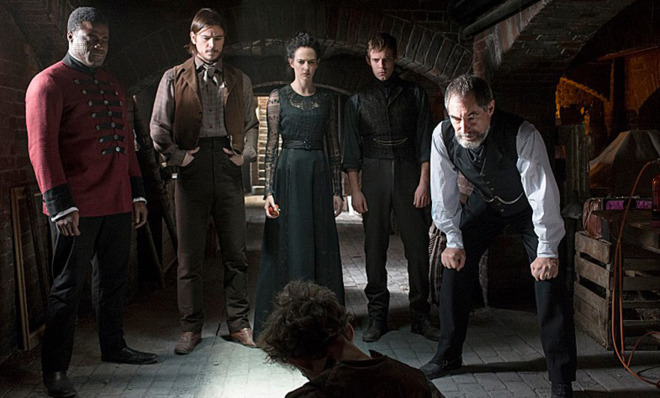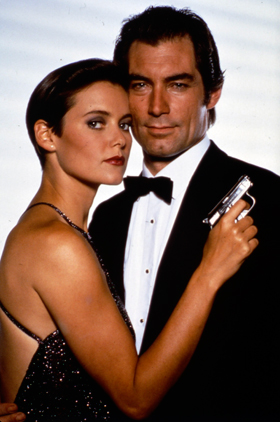Timothy Dalton opens up about Penny Dreadful, leaving James Bond, and the demon in all of us
"Actors, sometimes, they look for a character and they just want to play one thing. But human beings are so multifaceted, you know? We carry with us our good and our evil."


A free daily email with the biggest news stories of the day – and the best features from TheWeek.com
You are now subscribed
Your newsletter sign-up was successful
I answer the phone and am immediately greeted by a warm, polite, and unmistakably British voice: "Hello. This is Timothy Dalton."
Dalton quickly launches into a string of apologies, as he's calling several hours after our scheduled interview time, which he forgot because he was driving his children to school. "I'm mortified," he reiterates, repeatedly, throughout our conversation.
Indeed, Dalton is as warm and conversational in real life as Sir Malcolm Murray — the character he plays in Showtime's excellent new horror drama Penny Dreadful — is cold and solitary. Describing an emotional scene from the end of Penny Dreadful's first episode — a scene in which he doesn't even appear — Dalton becomes emotional: "I wept," he proclaims. "Literally. I just found it so moving."
The Week
Escape your echo chamber. Get the facts behind the news, plus analysis from multiple perspectives.

Sign up for The Week's Free Newsletters
From our morning news briefing to a weekly Good News Newsletter, get the best of The Week delivered directly to your inbox.
From our morning news briefing to a weekly Good News Newsletter, get the best of The Week delivered directly to your inbox.
Dalton is revelatory as the haunted, haunting Sir Malcolm, who assembles a group of misfits that includes Vanessa Ives (Eva Green), Ethan Chandler (Josh Hartnett), and Victor Frankenstein (Harry Treadaway) to explore what he calls "the place where science and superstition go hand-in-hand." Dalton himself isn't much of a horror fan, and he thinks for a long time before coming up with another piece of horror fiction that he admires. ("The first thing that comes to my mind is the original Alien, where you never saw the damned alien until the end. That was pretty scary.") He's also skeptical of television; in an interview with Entertainment Weekly several years ago, Dalton said that he doubted he'd ever take a recurring role in a TV series because he thinks he "would find it difficult to do the same thing year in and year out." With all that in mind, I had to ask: What was it about Penny Dreadful that turned his head?
"How much good writing is there around these days?" he asks. "There are some terrific movies made. Great TV? There is good writing in TV, and some splendid writing in TV. But it's not common. So when it's in front of you, and it's good, and you've got someone like [writer and showrunner John Logan], and someone like [director J.A. Bayona] doing the first two episodes… You've got to do it. You can't say no, really. You could — but you shouldn't."
But as an actor, Dalton remains wary about the boredom that could come with playing the same character for too long. "Once you've created a character… once you've done it, once you've taken on that challenge — and hopefully been successful — what is the joy of repeating it? I don't know that there is any joy in repeating it. Once you've done a few weeks in the West End or on Broadway, and you've really got to grips with a serious piece of work, there's got to come a moment when it loses some of its challenge because you've already done it. You've climbed the mountain."

Dalton waves away the idea that the fear of stagnation was a part of his relatively short tenure as 007. "That was my worry going into the James Bond franchise, certainly," he explains. "But it wasn't why I left." That doesn't mean he didn't have some concerns about the franchise: "On [Licence to Kill], I think I saw the script about two weeks before we started shooting. You know, that's not great, is it?"
A free daily email with the biggest news stories of the day – and the best features from TheWeek.com
Licence to Kill wasn't supposed to be his final James Bond movie; a third 007 movie, which would have starred Dalton, entered preproduction in 1990. "We had the script. They were interviewing directors. We were really rolling forward, ready to start. It was actually quite a good story, I thought," says Dalton. But a lengthy legal dispute between Eon Productions and MGM delayed the film indefinitely — and gave Dalton an out. "Because of the lawsuit, I was free of the contract," Dalton explains. "And [producer] Mr. Broccoli, who I really respected as a producer and as a friend, asked me what I was going to do when it was resolved. I said, 'Look, in all honesty, I don't think that I will continue.' He asked me for my support during that time, which of course, I gave him."
But when the lawsuit was resolved several years later, Dalton had a change of heart. "When [the next movie] did come about, it was probably four or five years later," he explains. "[Broccoli] asked if I would come back, and I said, 'Well, I've actually changed my mind a little bit. I think that I'd love to do one. Try and take the best of the two that I have done, and consolidate them into a third.' And he said, quite rightly, 'Look, Tim. You can't do one. There's no way, after a five-year gap between movies that you can come back and just do one. You'd have to plan on four or five.' And I thought, oh, no, that would be the rest of my life. Too much. Too long. So I respectfully declined." When Goldeneye hit theaters in 1995, it was Pierce Brosnan in the starring role.
In the years since, Dalton has turned in strong performances in everything from Hot Fuzz to Toy Story 3 — but Penny Dreadful is the meatiest role he's had in a while, and he's clearly relishing the depth and complexity that comes with playing Sir Malcolm Murray. "Vanessa, in a later episode, describes him as weak, foul, lustful, vainglorious," he explains. "You could add into that obsessive, manipulative, ruthless. You could also add in compassionate and courageous and all sorts of things. […] But this could be true about all of us, at certain moments of our lives, because human beings are such complex creatures. Actors, sometimes, they look for a character and they just want to play one thing. But human beings are so multifaceted, you know? We carry with us our good and our evil."
"I know [Penny Dreadful] is set in Victorian times — but it's about us, isn't it? Our guilt, and our shame, and our own personal demons, and how we work them out. How we come to terms with them, and whether we try to go back and turn them the right way. I think some people try to atone, and I don't think atonement leads to redemption at all. That's my personal feeling. You know, I think you have to accept your guilt. You have to live with your guilt. It's always struck me as being weird: You do something terrible, and you do penance. Penance isn't anything. I mean, what does penance mean? You do a few good deeds here or there? The consequences of your foul deeds will live on. You've got to handle redemption a different way."
Once again, we've taken a philosophical detour — but Dalton hastens to get back on track. "Let me bring it back to Penny Dreadful," he says. "You have to have characters you believe in, characters you empathize with. You have to have truth. And then you take them on a really interesting and scary journey. We are human beings watching, and we do have to empathize. I think that's what we're doing, and I hope that's what we're doing in Penny Dreadful. Showing an audience that all of these people are humans. Even if they're warped, even if they've got great problems. They're human beings, and they're trying to come to terms with themselves."
He pauses, then laughs. "But that's the boring side. On the other hand, you could say, 'All the good-looking people! Blood! Sex! Violence!' And fortunately, we've got it all."
Penny Dreadful airs on Showtime every Sunday at 10 p.m. You can stream the first episode here.
(Embedded Image: AP Photo/MGM/United Artists, FILE)
Scott Meslow is the entertainment editor for TheWeek.com. He has written about film and television at publications including The Atlantic, POLITICO Magazine, and Vulture.
-
 Health insurance: Premiums soar as ACA subsidies end
Health insurance: Premiums soar as ACA subsidies endFeature 1.4 million people have dropped coverage
-
 Anthropic: AI triggers the ‘SaaSpocalypse’
Anthropic: AI triggers the ‘SaaSpocalypse’Feature A grim reaper for software services?
-
 NIH director Bhattacharya tapped as acting CDC head
NIH director Bhattacharya tapped as acting CDC headSpeed Read Jay Bhattacharya, a critic of the CDC’s Covid-19 response, will now lead the Centers for Disease Control and Prevention
